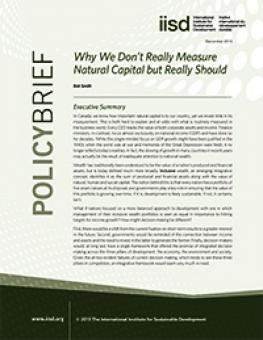
Why We Don't Really Measure Natural Capital but Really Should
This policy brief discusses the critical importance of shifting the focus of economic measurement from GDP alone to a broader measure based on the concept of inclusive wealth.
He identifies this as the sum of produced and financial assets along with the value of natural, human and social capital. The notion behind inclusive wealth is that every nation has a portfolio of five asset classes at its disposal, and governments play a key role in ensuring that the value of this portfolio is growing over time. He argues that IISD has a pivotal role to play in advancing this concept as of the underpinnings of the United Nation's new Sustainable Development Goals, which will help steer the global development agenda from 2015 forward.
Participating experts
You might also be interested in
Human Capital in Ethiopia, Indonesia, and Trinidad and Tobago
Human capital is the major component of comprehensive wealth in most countries, and how it is managed is key to long-term prosperity.
Financial Capital in Ethiopia, Indonesia, and Trinidad and Tobago
Like other assets of the comprehensive wealth portfolio, financial capital can be used to support a country's long-term prosperity.
Natural Capital in Ethiopia, Indonesia, and Trinidad and Tobago
Natural resources play fundamental roles in our well-being and lives, as well as sustaining a country's comprehensive wealth.
Produced Capital in Ethiopia, Indonesia, and Trinidad and Tobago
Part of comprehensive wealth, produced capital is the value of the stock of all human-made assets used to produce goods and services in the economy.